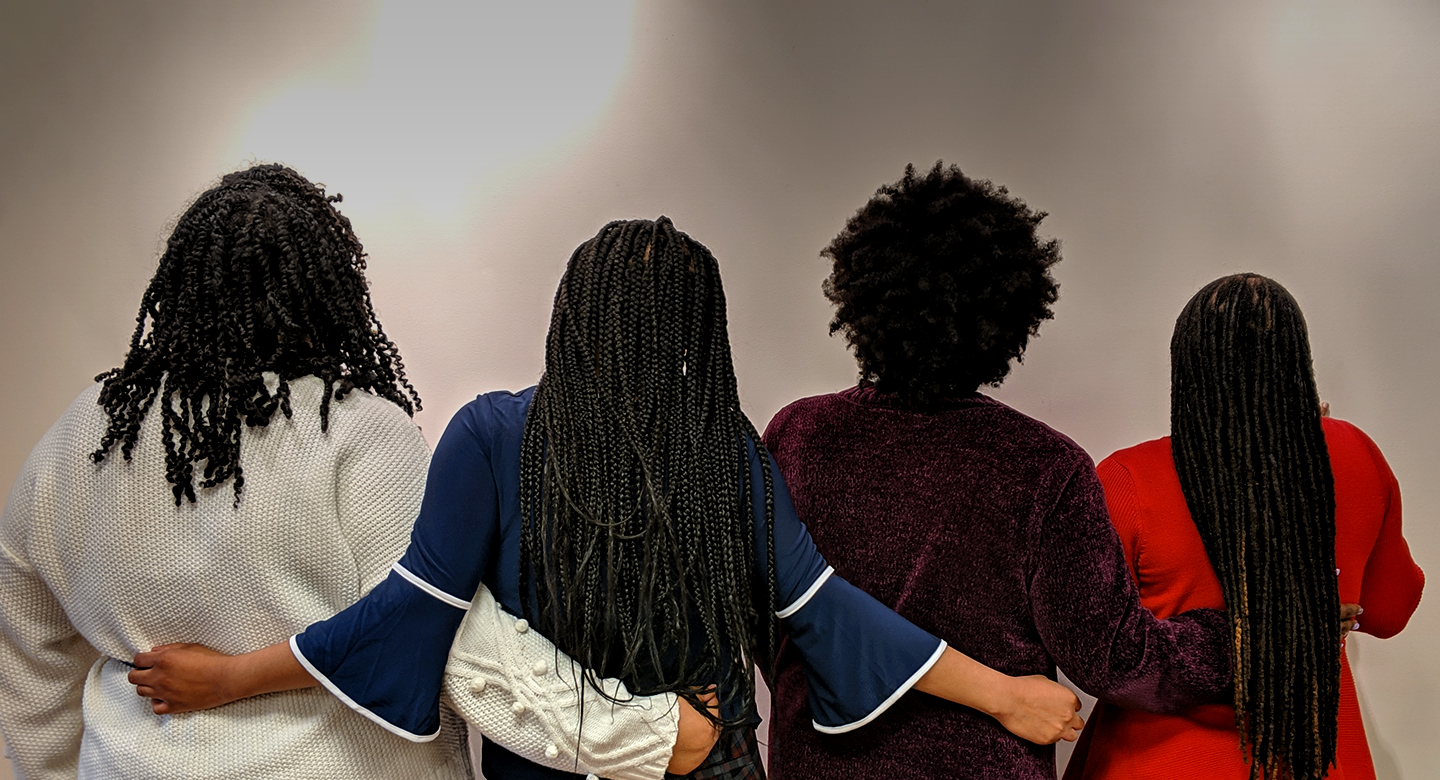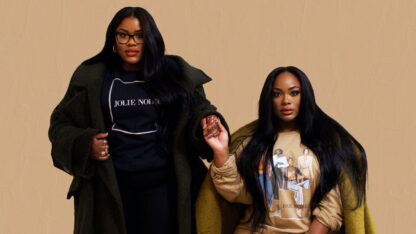More Black Women Are Rocking Their Natural Hair. Get To Know The Movement In Atlanta.

Fewer black women are choosing hair relaxers, with sales of the products having dropped 22.7 percent since 2016, a 2018 study found.
ANKITA ACKROYD-ISALES / WABE
World Natural Hair Show founder Taliah Waajid remembers when the black natural hair movement started to boom in Atlanta.
The former hair stylist opened up a natural hair salon in Atlanta in the early 1990s, back when she said, “no one was interested in natural hair.”
“Seeing the change from back then to me struggling to get someone to be interested, into now everywhere I go out of every five women four of them are natural whether their hair is straightened or not,” Waajid, natural hair care products entrepreneur and Allure Best of Beauty Award Winner, said.
Now, more black women are choosing to do “the big chop” or transition their hair into becoming chemical free, donning their coils or curls in the face of those biased against black natural hair. The “Good Hair” survey by Perception Institute, a group of advocates, researchers and strategists working to reduce discrimination, reported that prejudice and stigma around textured hair still exists.
“Going natural is deep and emotional because it’s about you really accepting who you are,” Mushiya Tshikuka, TV personality from WE TV’s “Cutting It: In The ATL,” said. “The moment you go natural, for real, is the moment when you say, ‘… I love me. I love me the way that I am.’”
Waajid’s World Natural Hair & Healthy Lifestyle Event, now running for 22 years in Atlanta, has grown to attract more than 30,000 attendees from all over the world. In recent years, more natural hair salons have also opened up their doors in the city, such as Ken Burkeen’s Huetiful Salon and Tshikuka’s The Damn Salon.
“I think Atlanta is one of the more progressive natural hair markets,” Burkeen, whose Atlanta salon opened in 2012, said. “Atlanta is probably the natural hair capital of the world or at least the country.”
Fewer black women are choosing hair relaxers, with sales of the products having dropped 22.7 percent since 2016, a 2018 Mintel study found.
“When you are walking down the street, compare it with walking down the street 10 years ago. When you walk in these streets right now, there are so many women embracing their natural…” Tshikuka of Runway Curls, a multi-textured extensions and wigs brand, said.
Looking Back On History
Biographer A’Lelia Bundles said it’s important to put today’s movement into historical perspective. The great-great-granddaughter of Madam C.J. Walker has studied and written multiple books about the life and legacy of the black hair care business owner. One of her biographies is being turned into a Netflix series starring Octavia Spencer.
“I think that each generation thinks that they are discovering something, creating something new, when in fact it’s not new. It goes through cycles and each cycle has its own particular dimensions,” the award-winning former journalist said.
Walker, a former washerwoman, was named the first self-made millionairess by Guinness World Records because of her hair care products, such as shampoo and ointment, that had the goal of boosting the health of black natural tresses, according to Bundles. Madam C.J. Walker Beauty Culture products are still being sold in stores and online.
“Her real push, in the beginning, was healthy hair. That is the quintessential natural hair movement is to have healthy hair that is natural hair that grows out of your scalp,” Bundles said.
Through the years, natural hair came back into the spotlight, such as when Afros were worn to make a political statement during the Black Power movement in the 1960s or as a beauty style worn by celebrities, such as movie star Pam Grier, in the ’70s, according to “Hair Story: Untangling the Roots of Black Hair in America,” which was first released in 2002 and updated in 2014.
“Black hair should be recognized as a significant part of black identity.”
Lori L. Tharps, journalist and co-author of “Hair Story”
Embarking On A Hair Journey
Tharps has been told by some women that her book, which is being taught in some colleges courses as the main text, changed their lives.
“When we do tours with the book, we say ‘it feels like we are going to church,’ because people end up testifying,” Tharps said. “We were at Spelman, actually, and a student had read the book and she stood up in the middle of this auditorium. And she pulled her wig off and told everybody that after reading the book, she was going natural. And it was so emotional.”
Some even bring the book to the salon as support while they are transitioning.
“We’ve had so many people tell us that they held the book in their lap when they went to the salon and asked to have their perm cut off,” Tharps said.
The process of going natural can become an emotional one because of “the identity that is attached to the hair and how the hair is worn,” according to Burkeen.
“When you have a client who has been told for the last 25, 30 years of their life that their natural hair is unkempt, not beautiful, unprofessional, the emotional challenge of going away from relaxed hair and embracing natural hair is really great.”
Ken Burkeen, founder and CEO of Huetiful Salons
Tshikuka said she wants to show women how natural hair is runway ready and office appropriate.
“Our aim is to allow women to see natural hair from a different light,” she said. “When I’m on TV or when I’m doing interviews or when I’m in front of the world and on the stage, I show them that you can be a woman with status, power, educated and still be natural.”
Overcoming Stigma
Recently, natural hair has been in the news. Last December, NPR reported that New Jersey high school student Andrew Johnson’s dreadlocks were cut by a trainer during a wrestling match when he was told by the referee to either cut his hair or forfeit the game. Alan Maloney, the referee, has since been suspended.
“…The reason why you are hardwired to think that this boy’s hair signifies something violent, dangerous or inappropriate is not because that is actually true. It’s because you’ve been fed a bushel of lies for 400 years,” Tharps said.
She said she plans to send her book to the school official.
“We want this book to educate and empower black people about a very significant part of their identity and we wanted to educate non-black people about something that would have no reason to know about or previously had no access to this information, with the hope that with greater understanding comes a more just and peaceful society,” Tharps said.
Burkeen said change starts by increasing the visibility of people who come from all walks of life.
“As our workplaces and communities become more diverse, I think people will be more accepting of natural hair across many communities and industries,” Burkeen said.
Today’s natural hair movement is not a fad, Tshikuka said. It’s here to stay.
“What’s happening right now is no longer political. It is everything … It’s emotional. It’s fashionable,” she said. “It’s built in the heart. We are going natural within ourselves before natural on the head … When you’re natural mentally, emotionally and all that, it doesn’t matter. You’re not going back, because … it’s more deeply rooted than just hair.”








